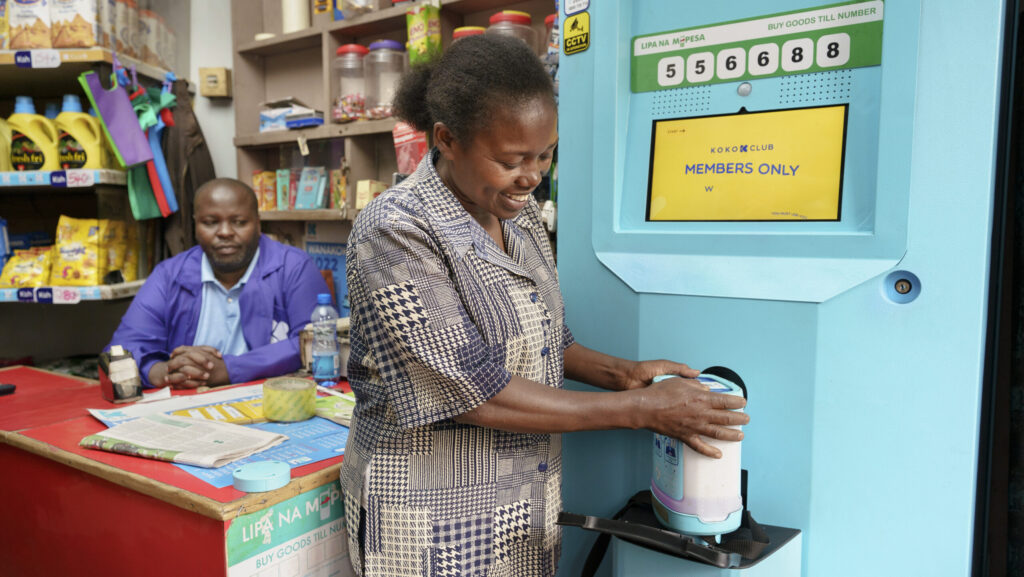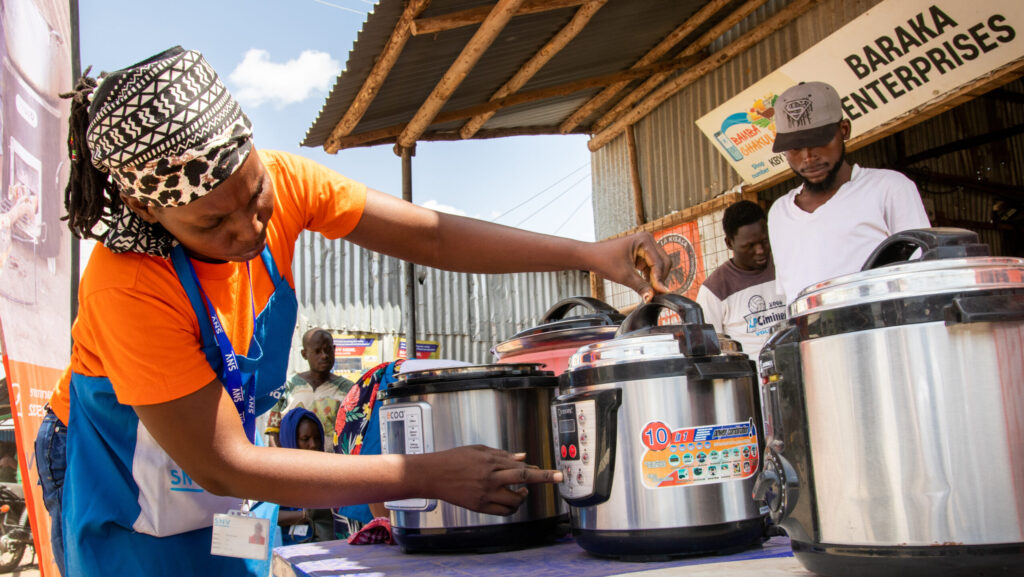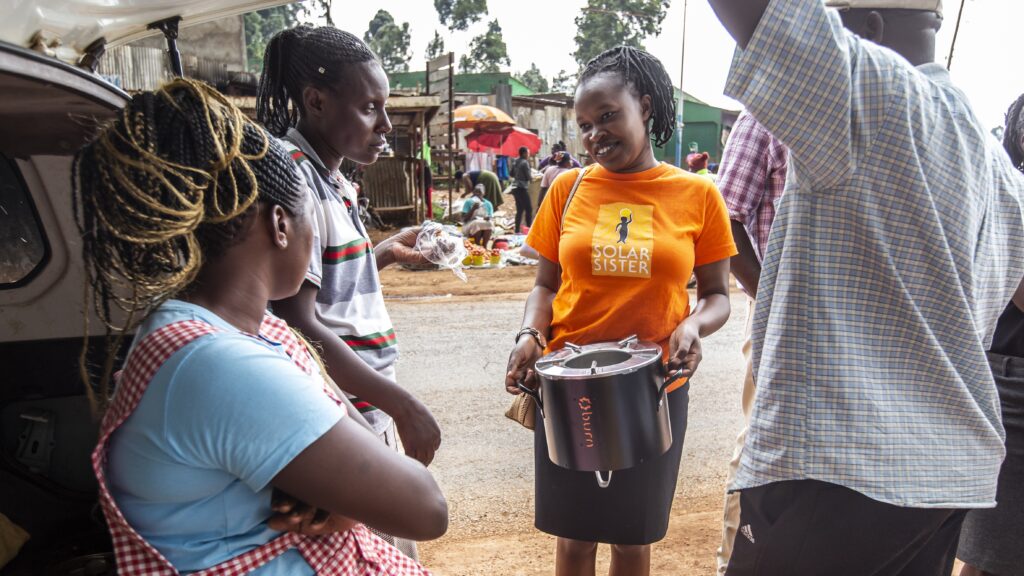Gold Standard: Setting New Benchmarks for Carbon Finance in Clean Cooking
Gold Standard is a not-for-profit working to catalyze more ambitious climate action to achieve the global goals through robust standards and verified impacts. The organization’s focus is on impact rather than a specific mechanism, meaning their standards can support the issuance of carbon credits and other financial tools.
Margaret Kim, CEO of Gold Standard, spoke with CCA about the organization’s new metered methodology and what they’ve learned working in the clean cooking space the past 20 years.
This interview is part of a series of conversations CCA is having with business leaders across the clean cooking sector.

Clean Cooking Alliance (CCA): Tell us about Gold Standard and its work on clean cooking.
Margaret Kim (Kim): For almost two decades Gold Standard has been at the vanguard of the clean cooking revolution, collaborating closely with the Clean Cooking Alliance (CCA) and the brightest minds in the sector. Our commitment has always been to funnel funding into projects that unlock community access to sustainable energy services. Clean cooking is our largest portfolio of activities and one in which we take particular pride. Throughout that time, we’ve pioneered best-in-class methodologies and supporting tools and continue to innovate — with our recent metered methodology setting new benchmarks.
CCA: You’re nearing your five-year mark with Gold Standard. How have you seen the carbon market for cooking evolve?
Kim: The carbon market has undergone a profound transformation in the last five years, particularly with the realization of the Paris Agreement Article 6 Rulebook in Glasgow.
This period has seen an upsurge in financial interest and the emergence of influential bodies and regulatory measures such as the IC-VCM and ratings agencies. The claims made about the use of carbon credits have also come under immense scrutiny, as a more educated public and stronger regulation emerge. The core of the market hasn’t changed though, funding climate and sustainable development action in return for the ability to make claims about climate responsibility.
We believe that companies need to abate their own emissions in line with science and then, while they are reducing but still emitting, they need to recognize that and use it as a spur to fund other climate action. Clean cooking is the ideal target for this — highly additional and outside the scope of most of the world’s value chains and regulation, as well as delivering improvements to real people’s lives.
[ Discover CCA’s recently launched Principles for Responsible Carbon Finance in Clean Cooking. ]
CCA: Given the increasing focus on the integrity and transparency of clean cooking carbon finance, what needs to be done to ensure projects deliver on their promises?
Kim: In clean cooking and carbon finance, the pursuit of excellence and adherence to best practices is a continuous journey. The key collaborators in clean cooking and the carbon market have always looked to apply the latest understandings of good practice. Recognizing the dynamic nature of these standards is crucial. We have a dual challenge: to relentlessly advance our methodologies while defending past achievements.
It can be an unforgiving space if, in retrospect, you find those good practices become out of date, but this is why standard bodies like Gold Standard exist — to work with NGOs, scientists and project developers on the ground to learn and evolve the rules in line with science.
Our current view is that the methods are up to date, but key reference values, such as fNRB, are due to be updated soon.

CCA: Gold Standard works with a diverse array of organizations from both the private and the non-profit sectors. What role have they played in the progression of the organization?
Kim: Our essence is defined by integrity, clarity and logic, and we strive to work with partners who share these values. The progress we are making cannot be done without a diverse array of partners and we feel immensely proud to have taken part in and led the discourse on carbon markets and clean cooking. Over the last 20 years we’ve grown into that role, and in the last five years have found our voice as an advocate for credibility and legitimacy. Without credibility, funding quickly dries up.
CCA: Gold Standard’s new metered methodology has been making headlines recently. Tell us more about that and how it could impact the sector.
Kim: The methodology marks a significant step forward and is designed for projects that integrate more sophisticated technological solutions. While we acknowledge that metered technology is not yet globally available, we hope that the methodology will encourage uptake by encouraging funding for these vital projects. Gold Standard’s metered methodology is already being used as the foundation for a new methodology being developed by the Clean Cooking and Climate Consortium, a group that includes Gold Standard, UNFCCC, CCA, and others working in the climate and cooking space.
CCA: Are there any areas of work around cooking and carbon that would benefit from additional support or focus?
Kim: I’d love to see more support for our assurance community. I’m consistently grateful for the professionalism and integrity of that part of our community, and we’ll be rolling out more to support them and learn from them.
We also see great value in building a sustainable pool of experts who understand the local context better than anyone. In this context, we’ll be working with regional organizations and governments to support the development of assurance experts on the ground in under-represented regions, such as Africa.
 CCA: What inspires you about your work and the team you work with?
CCA: What inspires you about your work and the team you work with?
Kim: I learn from my colleagues every day. It inspires me to work with a group of passionate and mission-aligned individuals who believe in the vision of this organization: climate security and sustainable development for ALL.
This is obviously a very ambitious goal, and it can be exhausting at times, but I work with a team who support each other — and who often help me — to get us closer to that vision.
Real impact on the ground and real stories of people inspire me. Clean cooking is a great example. In supporting these projects, we not only see mitigation outcomes but see the positive impact these projects have on people: more women can spend time to engage in economic activities, more children enter school instead of fetching wood, family health conditions improve, and overall livelihood improves in those communities. This is why I work at Gold Standard.
